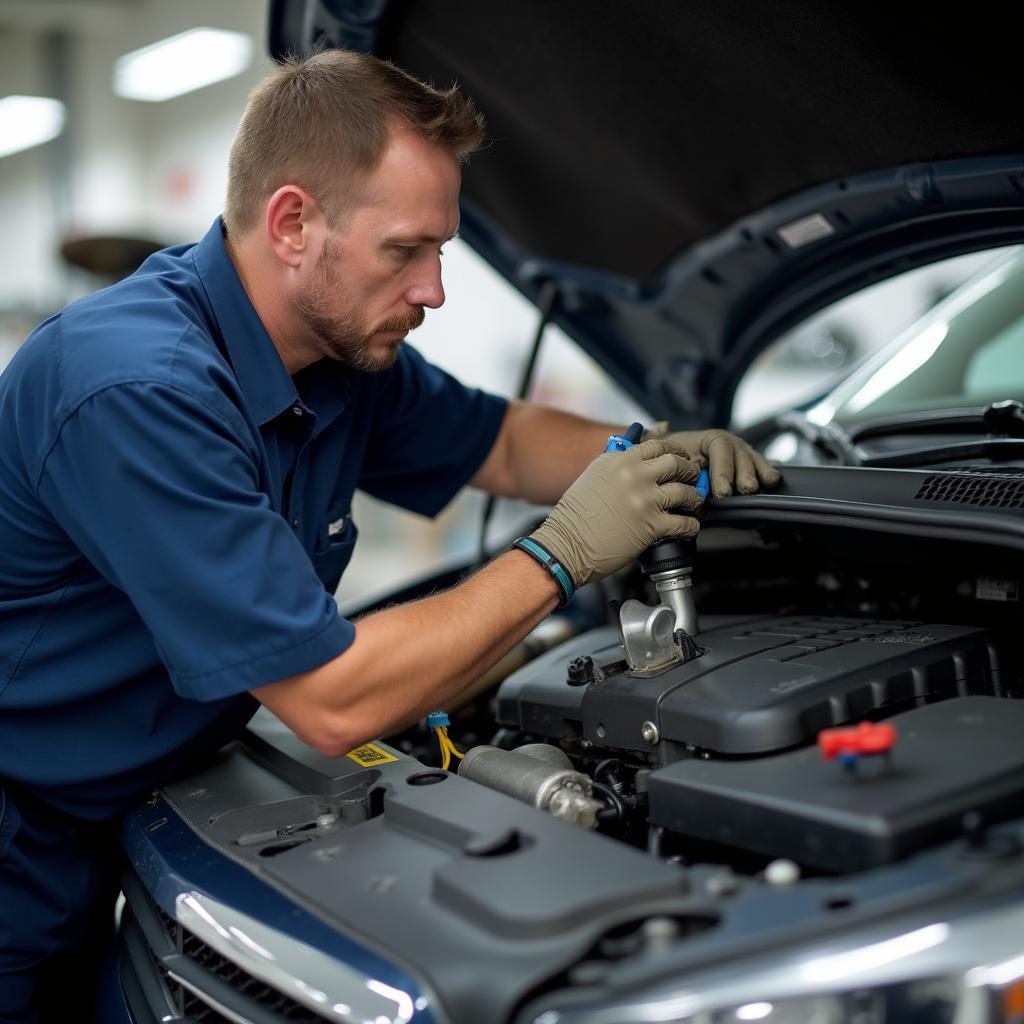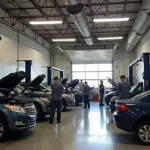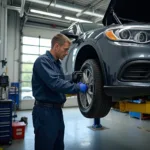Dealing with an overheated car is a stressful experience no driver wants to face. Whether you’re stuck on the side of the road or noticing your temperature gauge creeping up, understanding the importance of prompt and professional Auto Overheat Service is crucial.
Common Causes of Car Overheating
Before diving into the intricacies of auto overheat service, let’s shed light on the common culprits behind this automotive headache.
- Coolant Leaks: A leak in your car’s cooling system, often stemming from a cracked hose, faulty radiator, or worn-out water pump, can lead to a significant loss of coolant, causing your engine to overheat.
- Faulty Thermostat: This small but mighty component regulates the flow of coolant throughout your engine. If it malfunctions and remains stuck in the closed position, it restricts coolant circulation, leading to overheating.
- Malfunctioning Radiator Fan: Your radiator fan plays a vital role in cooling down the engine, especially during slow speeds or idle. A broken fan, or one that’s not receiving power, can hinder the heat dissipation process, causing your engine to overheat.
- Clogged Radiator: Over time, sediment, rust, and debris can accumulate in your radiator, obstructing the flow of coolant and reducing its cooling efficiency.
The Importance of Timely Auto Overheat Service
Ignoring an overheating engine can lead to catastrophic consequences, including:
- Head Gasket Failure: One of the most dreaded and costly repairs, a blown head gasket occurs when the extreme heat warps the cylinder head, compromising the seal between the engine block and cylinder head.
- Engine Damage: Prolonged overheating can warp engine components like the cylinder heads and engine block, leading to expensive repairs or even complete engine failure.
- Cracked Engine Block: In extreme cases, the intense heat generated by an overheated engine can cause the engine block to crack, rendering your car beyond repair.
What to Do When Your Car Overheats
 Driver Checking Engine Temperature
Driver Checking Engine Temperature
- Pull Over Immediately: As soon as you notice your temperature gauge rising or see the warning light illuminated, safely pull over to the side of the road and turn off your engine. Continuing to drive with an overheating engine can exacerbate the issue and lead to more severe damage.
- Let the Engine Cool Down: Allow your engine ample time to cool down before attempting any inspection or repairs. Never remove the radiator cap while the engine is hot, as the pressurized hot coolant can cause severe burns.
- Check the Coolant Level: Once the engine has cooled down, carefully open the radiator cap (using a rag or gloves for protection) and check the coolant level. If it’s low, add a 50/50 mixture of coolant and water to the radiator.
- Call for Professional Auto Overheat Service: Even if you’ve topped up the coolant and your car seems to be running fine, it’s crucial to seek professional auto overheat service. A qualified mechanic can diagnose the underlying cause of the overheating and perform the necessary repairs to prevent it from happening again.
auto service specials coupons roswell
What to Expect During an Auto Overheat Service
When you bring your car in for auto overheat service, a skilled technician will typically:
- Perform a Visual Inspection: They’ll start by visually inspecting the cooling system components, looking for any signs of leaks, cracks, or damage.
- Pressure Test the Cooling System: This test helps identify any leaks within the cooling system that may not be visible during a visual inspection.
- Inspect the Thermostat: They’ll check the thermostat’s operation to ensure it’s opening and closing at the correct temperatures.
- Check the Radiator Fan: The technician will inspect the radiator fan for proper function, including its motor, blades, and electrical connections.
- Flush and Refill the Cooling System: A coolant flush removes any rust, sediment, or contaminants from the cooling system, ensuring optimal performance. They’ll then refill the system with the correct coolant mixture.
Preventative Measures to Avoid Overheating
 Mechanic Inspecting Car Cooling System
Mechanic Inspecting Car Cooling System
- Regular Coolant Checks: Make it a habit to check your coolant level regularly, especially before long trips.
- Scheduled Coolant Flushes: Follow your car manufacturer’s recommended maintenance schedule for coolant flushes.
- Inspect Belts and Hoses: Regularly inspect your belts and hoses for any signs of wear and tear, cracks, or bulges.
- Address Leaks Promptly: If you notice any coolant leaks, address them immediately by taking your car to a trusted mechanic.
- Don’t Ignore Warning Signs: Never disregard warning signs like a rising temperature gauge or an illuminated warning light.
Auto Overheat Service: Expertise You Can Trust
Dealing with an overheating car can be stressful, but proactive maintenance and professional auto overheat service can save you from costly repairs and keep your car running smoothly for miles to come.
Remember, when it comes to your car’s cooling system, prevention is always better than a tow truck.


